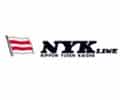Japan’s First LNG-fueled Tugboat Engine Donated to Seafarer Education Institutions Utilizing an Actual Next-Generation Vessel to Develop Human Resources to Lead the Japan Maritime Cluster

In February, NYK Line (hereinafter “NYK”) and IHI Power Systems Co., Ltd. (hereinafter “IHI Power Systems”) donated part of the main engine (6L28AHX-DF, developed by IHI Power Systems) of Japan’s first liquefied natural gas (LNG) fueled tugboat “Sakigake” to Tokyo University of Marine Science and Technology (hereinafter “TUMST”) and the Japan Agency of Maritime Education and Training for Seafarers (hereinafter “JMETS”).

Presentation Ceremony at TUMST
From left:
Kazuhiko Fukuda, Deputy General Manager of Marine Group, NYK; Atsuhiko Kurosawa, General Manager of Fuel Solution Group, NYK; Shinichi Motoda, Dean of the Faculty of Marine Engineering, TUMST; Toru Motoda, Deputy Division Director and General Manager of Marine Power System Business Division, IHI Power Systems
Presentation ceremonies held at TUMST on March 21 and JMETS on March 22 were attended by Shinichi Motoda, dean of the faculty of marine engineering at TUMST; Noriaki Tajima, president of JMETS; Toru Motoda, deputy division director and general manager of IHI Power Systems’ Marine Power System Business Division; and Atsuhiko Kurosawa, general manager of NYK’s Fuel Solution Group; among others.
Comments
Shinichi Motoda, Dean of Faculty of Marine Engineering, TUMST
Thanks to the cooperation of NYK and IHI Power Systems, we received the engine parts of the 6L28AHX-DF, the first LNG-fueled ship engine in Japan. We will introduce our students to this technology, which was a pioneer of gas engines. We would like to express our deepest gratitude to everyone involved.

Image of the exhibition at the Meiji Maru Maritime Museum
Noriaki Tajima, President, JMETS
NYK and IHI Power Systems have given us some of the engines used in their LNG-fueled tugboat Sakigake to assist in the education of the engine department. These parts will be effectively utilized as teaching materials in a training course for the fourth-grade maritime engineer’s license at the National Tateyama Maritime Polytechnical School and courses on low flashpoint fueled vessels at the Marine Technical College. We would like to ask for your continued warm support and understanding.

Presentation Ceremony at JMETS
From left:
Masayoshi Oyanagi, Deputy Division Director and General Manager of Marine Power System Business Division, IHI Power Systems;
Noriaki Tajima, president of JMETS;
Atsuhiko Kurosawa, General Manager of Fuel Solution Group, NYK
Toru Motoda, Deputy Division Director and General Manager of Marine Power System Business Division, IHI Power Systems
Together with NYK, we are very honored to be able to donate to TUMST and JMETS some of our engines from Japan’s first LNG-fueled ship, Sakigake. We hope that students responsible for the future shipping industry will gain a deeper understanding and learning through hands-on experience. We also hope that this donation will help increase interest in carbon-neutral initiatives and contribute to a sustainable future.
Atsuhiko Kurosawa, General Manager, Fuel Solution Group, NYK
We, together with IHI Power Systems, were delighted to hear that TUMST and JMETS will be taking this opportunity to use a part of the engine of Sakigake, the first LNG-fueled tugboat in Japan. We are very happy that this engine, which has contributed to the popularization of LNG-fueled vessels in Japan, will be used again by students responsible for the future of the Japanese maritime industry. We will continue our various activities to be a flag bearer for the decarbonization of the world through co-creation with members of the Japan maritime cluster.
Sakigake was completed in August 2015 at the Oppama Plant of Keihin Dock Co., Ltd. and operated in Tokyo Bay for about eight years as Japan’s first LNG-fueled tugboat. The vessel is currently being converted to an ammonia-fueled tugboat with even lower greenhouse gas (GHG) emissions by a consortium that includes NYK and IHI Power Systems. The consortium is working on the development of a demonstration project for the commercialization of vessels equipped with a domestically produced ammonia-fueled engine. This project was selected as a Green Innovation Fund project in October 2021 by Japan’s New Energy and Industrial Technology Development Organization (NEDO).
The donated items will be used for human resource and technological development at TUMST, where they will be displayed at the Meiji Maru Maritime Museum on the Etchujima campus and used as test subjects for next-generation engine development. JMETS will use the items at its National Tateyama Maritime Polytechnical School (Chiba Prefecture) and Marine Technical College (Hyogo Prefecture) as practical training equipment for license acquisition and for human resource and technological development.
The two companies are sharing knowledge and technology gained from their business activities through cooperation with maritime educational institutions nationwide. The companies will also support and promote the development of future human resources and the further growth of the Japanese maritime industry.
Source: Nippon Yusen Kaisha
